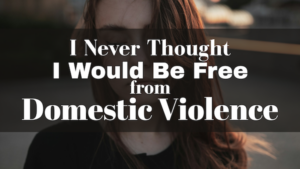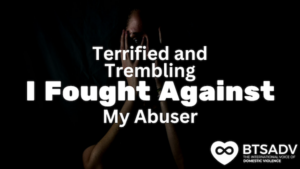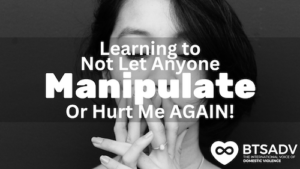My body was violated over and over again.
I can’t tell you how many times the stench of his spit being launched at me lingered on my face. Bruises created horrible artwork throughout my body. Being cheated on repeatedly and told the most heinous things about my looks and my character often rotated with moments of honeymooning and wooing me. It left me in a constant state of confusion and battling my own emotions. And then, there was the time that I woke up after being raped by him right after we split up. I had no idea what had happened after he gave me a drink while visiting the children, and my money and dignity were stolen.
Now the question stands, how can I truly love the body that I am in after it was beaten down so badly, mentally, physically, and emotionally?
Abuse can lead to many mental health conditions, and that includes body image issues and eating disorders. Multiple factors contribute to this from the low self-esteem that comes along with years of torture to deep-rooted shame from our bodies being objects of someone else’s pain or pleasure. These issues can lead to years of being our own worst enemy, and in some ways, it allows the war waged against us through abuse to continue.
Trauma responses are often formed when our bodies must become accustomed to surviving crises. We will find ways to cope with the surrounding circumstances. Disassociation is one of those responses. My body wasn’t just exploited sexually, but the physical abuse and feeling of being trapped physically and mentally caused me to disassociate from my body. How can you feel a connection with the outward parts of you when you live in a constant state of fear that they are going to be violated? It’s hard to love your body when you feel detached from it, or even worse like it’s not your own.
Constant states of trauma also lead to inflammation, aches, pains, and other physical symptoms. When your mental health is not taken care of, the body can send off “alarms” in the form of somatic conditions. Feeling a lack of energy, inflamed, and achy does not cause us to feel confident. This can play mental games with our body image as it did mine.
Low self-worth and self-esteem are huge components of any kind of eating disorder or issue with the body. Abuse survivors are not just verbally put down, but gaslighting causes them to feel as if they are “crazy” for most of the relationship. That feeling can lead a person to doubt themselves in all areas, and suddenly, the person feels as if something is wrong with them. Abuse is the tornado that demolishes a person’s self-worth because it happens quickly and with little warning. If we do not love ourselves, it’s open season for our brains to desire something to fill the voids that are left empty within ourselves.
Many people run to food for comfort from traumatic situations. This can lead to binging, food addiction, and even eating disorders in serious situations. Those at risk for eating disorders, including body dysmorphia, tend to have unresolved trauma, and those conditions change the chemistry of the brain to believe hard-wired thoughts such as food being a reward, a lack of food being a punishment for our “bad behavior” of eating too much, or starving oneself as a form of control when the person feels like they have lacked it over their lives because of their trauma. It’s incredibly deep, and although your body image issues may not be that severe, we must be careful that it doesn’t become something much greater.
So, how do we change these mindsets that have held us captive for so long? How do we take the pain away from self-hatred or body image issues? It starts with acknowledging the problem, to begin with. I believe it’s okay to know that we may continue to have “those days” where we do not feel so hot. Hormones can be our biggest barrier at times in life, especially for women. We are allowed to not always be okay, but there must be a point where a bad day doesn’t turn into a bad week or a bad month, and suddenly, we have a stronghold in our lives.
Healing may take more drastic measures than just positive self-talk. Some may need to completely change the reward receptors in the brain that believe food is the ultimate prize for a job well done or comfort for our pain. Some may have to rewire using a lack of food or over-exercising to feel powerful or in control. Others may need to heal from the sexual abuse that causes them to overindulge when eating to “make them unattractive” to anyone ever wanting them sexually again. Therapy can help all these issues and more, including changing the perspective of what we see when we look in the mirror, whether it’s an occasional off day or full-blown body dysmorphia. There is absolutely no shame in getting the mental help that you need.
Above all else, it takes falling in love with ourselves. That may seem impossible when you are dealing with abuse, and that is another reason why it is so vital to get out. It’s extremely difficult to heal in a place that makes you sick. Once you are out, you must be attentive to your journey of self-care. Find out who you are deep down without the dark cloud of abuse hanging over you. Grieve, process, and release those things that have been done to you and begin to allow them to lose their power over your life. As you start to see your worth, you will also realize that your body is a beautiful masterpiece that was created to be a unique part of this world. It belongs to you and you only, even if it didn’t feel that way at times. Embrace the adventure of self-discovery and become the best friend that you have always desired to yourself.
You can heal from abuse, and you can heal from body image issues and disorders as well.









